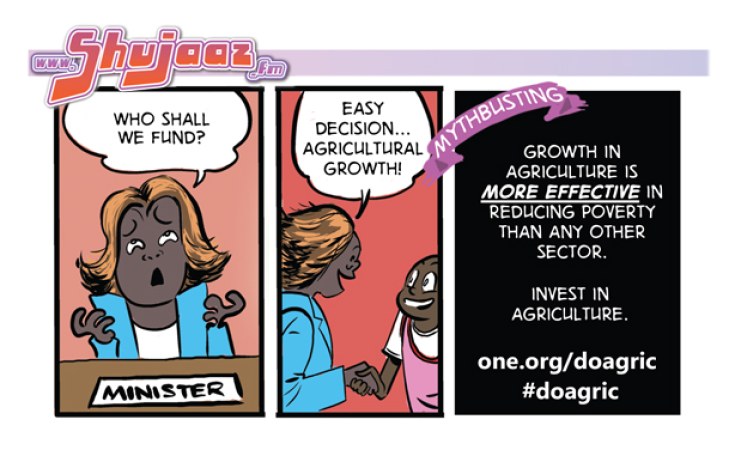New technologies and ideas - from mobile phone information systems to new crop varieties - are rapidly transforming agriculture across Africa.
Yet the sector continues to be stereotyped as one synonymous with poverty and subsistence.
Simply put, people don't believe it will pay a proper wage, let alone their children's school fees or health bills. Farming is seen as a dead-end job, something of no interest to aspiring youth.
Following the theme of this year's annual letter by Bill and Melinda Gates, I would like to debunk the myth that Africa's farmers will always be poor.
In fact, there are huge opportunities for farmers. Yields of staple crops have steadily increased over the past decade and there is potential for them to increase by two or even three times more.
This would have a tremendous impact on farmers, their families, communities and economies. Research from around the world shows that every one percent growth in crop yields leads to a 0.8 percent fall in the number of people living in absolute poverty.
Nor is agricultural and income growth small-picture stuff. There are strong links between growth in agriculture and growth in the wider economy. Every U.S. $1 generated in income in agriculture created U.S.$1.88 in the wider economy in Burkina Faso, and U.S. $1.50 in Zambia. Agricultural growth is eleven times more effective in reducing poverty than growth in any other sector.
It is youth and women who have critical roles in delivering this progress. There are many examples of young Africans launching exciting new projects in agriculture - from radio programmes that give advice to farmers, to new mobile phone platforms that provide them with the latest market prices.
A great deal has been documented about the obstacles faced by women farmers but not enough about the economic gains that could come from removing these obstacles. A 20 to 30 percent increase in yields and hundreds of millions of people lifted out of poverty globally could be delivered.
Of course, for this myth to be truly debunked, the right conditions need to be in place for farmers to seize opportunities and make a good living.
That is why civil society across Africa - supported by NGOs like ONE and ActionAid, and individuals like Nigerian singer D'Banj - have come together as part of the DO AGRIC campaign to ask governments to provide the support necessary to enable farmers to make a good living.
We are now ten years down the road from the Maputo Declaration, in which African governments committed themselves to allocate ten percent of their national budgets to agricultural development. But while there have been really impressive results, some countries aren't on track.
A decade on from that historic declaration, it is time for African governments to renew their commitments to develop agriculture.
Increasing funding is vital. We also need to address areas previously overlooked, such as removing barriers to intra-regional trade and establishing mechanisms to minimise the loss of revenue caused by poor post-harvest management.
African civil society is also pressing governments for much more rigorous monitoring and evaluation of what's happening in agriculture on the ground. After all, it is only when we know where progress is taking place that we can allocate greater resources to areas where there are shortfalls.
Addressing these challenges, and others, is the key to unlocking the rich potential of African farmers, lifting millions out of poverty and driving wider prosperity.
This July's African Union summit provides the opportunity to commit that support and kill off once and for all the myth that Africa's farmers will always be poor.
Mercy Karanja, who grew up on a farm in Kenya and went to school on account of her parents' farming, is a senior programme officer and senior regional advisor to East Africa for agricultural development at the Bill & Melinda Gates Foundation.


